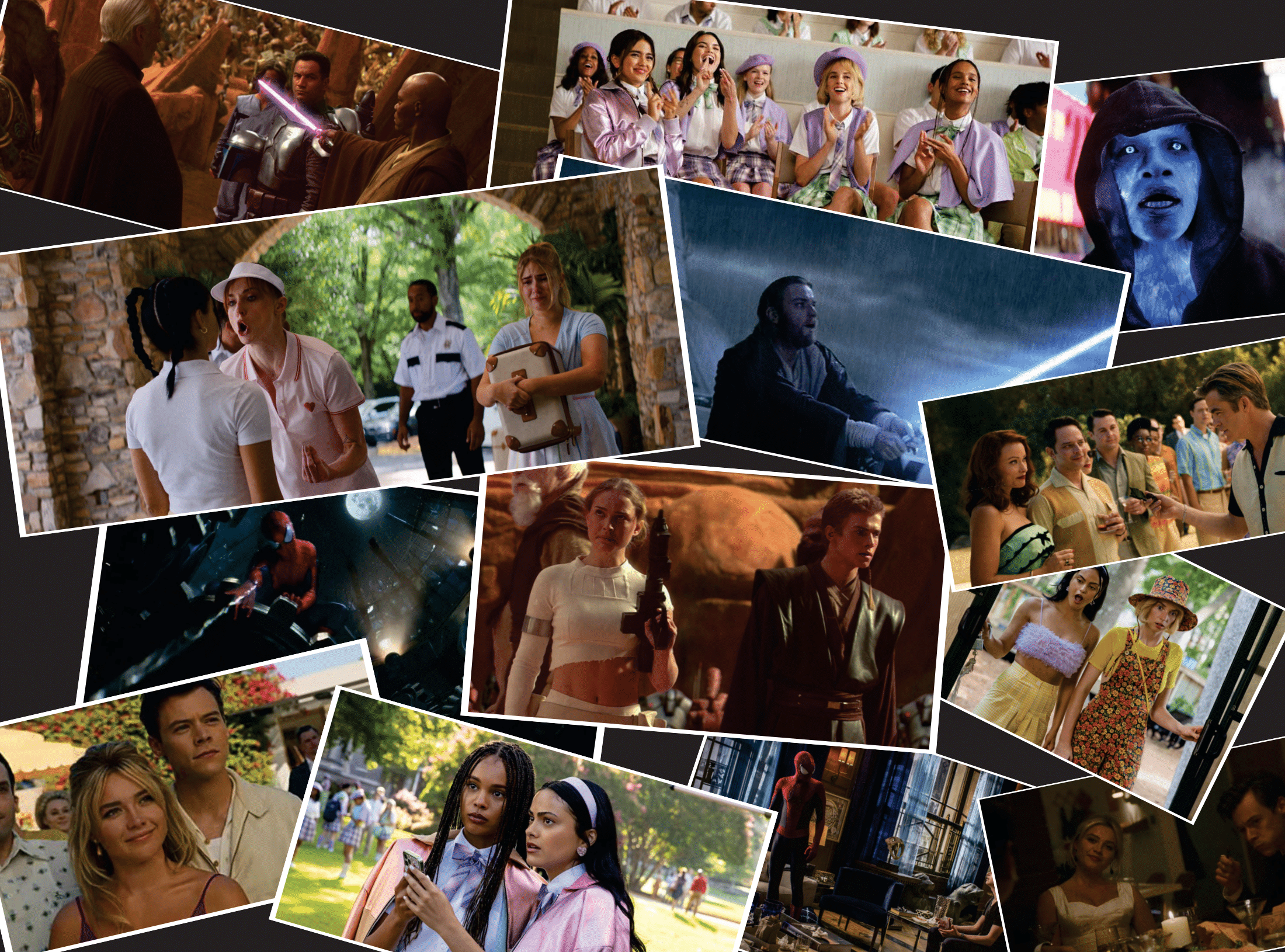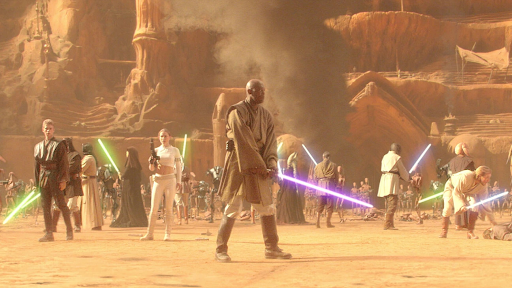Media and Music: Bad Movies That Are Saved by Their Soundtracks
How can a movie with horrible acting, plot holes galore, and cheesy effects ever be redeemed? Turn to the music instead.
In Media and Music, our writers take a deep dive into how movies use scores and songs to engage viewers, give new meaning and tone to some of our favorite scenes, and establish themes. It almost goes without saying, but there are spoilers abound.
Written by Janie Bickerton
Illustrated by Gregory Muggli
Sometimes, a movie can be so hard to watch that you are compelled to close your eyes to shut out the cringe. While your eyes are no longer subject to atrocious visuals, the sound of poorly-written dialogue still permeates your eardrums. Scattered between the abysmal lines comes a sound so melodic it has you reopen your eyes again. These songs suddenly make the movie unbearably captivating. Here are four movies whose soundtracks alone serve as their saving graces.
STAR WARS EPISODE II: ATTACK OF THE CLONES
Image courtesy of Lucasfilm
The second installment of the Star Wars Prequel Trilogy includes stone-cold acting, hilariously bad dialogue, and one of the blandest romances in cinematic history. Anakin Skywalker and Padme Amidala’s amorous scenes are so painful to watch, it makes you wonder whether the screenwriters are also from galaxies far, far away. Even so, fans swoon over the wedding scene that closes the film because of the celestial score, which alone makes their love convincing. Following in the footsteps of its Star Wars predecessors, “Attack of the Clones” includes fantastic galactic themes, with “Across the Stars (Love Theme)” as arguably one of the best musical compositions to come from the Star Wars franchise. It’s a powerful song that carries “Attack of the Clones” and encapsulates the wonder of falling in love against all odds. The chill-inducing crescendo of the light harmony of the harp into an orchestral euphony is John Williams at his finest. In a score that successfully heightens the intensity of lightsaber duels and arena battles with other pieces, “Across the Stars (Love Theme)” offers a glimpse of humanity amidst a burgeoning galactic war through its ethereal conveyance of the power of love. This song alone makes the lackluster flirting scenes worthwhile.
DON’T WORRY DARLING
Image courtesy of Warner Bros.
The soundtrack is what makes Olivia Wilde’s surface-level attempt at a psychological thriller “feel like a movie,” as Harry Styles nonsensically commented at the Venice Film Festival. Sure, this movie has pretty visuals and an all-star cast, but the soundtrack is the true star. The score follows protagonist Alice Chambers’ development from a happy housewife in a 1950s utopia to a distraught rebel burdened with the truth of her community. The cheerful tune of “Bang Bang” by Dizzy Gillespie plays as a content Alice kisses her husband goodbye before he drives to his mysterious job. Brenton Woods’ “The Oogum Boogum Song” follows Alice’s realization of the nebulous disturbances in her community, as if the jovial music is attempting to dissuade her from her suspicions. Suspenseful music looms as the truths of her community come to light, culminating in the sinister chants and unsettling strings of “Victory Chase.” Despite this gradual change from happy retro songs to disturbing instrumentals, one song remains constant and grounds the plot of the movie. “With You All the Time,” a catchy, eerily familiar tune sung by Florence Pugh and Harry Styles, is the standout of the soundtrack because it ties together the many, many loose ends of the film. I would even argue the tunes in “Don’t Worry Darling” are better than Olivia Wilde’s special salad dressing.
DO REVENGE
Image courtesy of Netflix
Despite receiving fairly good reviews, this teenage dark comedy totally misses the mark on the intricacies of high school dynamics. “Do Revenge” is saved through its pop-rock soundtrack that epitomizes what it’s like to be in Generation Z. “So Hot You’re Hurting My Feelings” by Caroline Polachek, “she’s all i wanna be” by Tate McRae, and “Happier Than Ever” by Billie Eilish capture the ups and downs of high school romance, insecurity, and messy break-ups. The heavy guitar line of “Brutal” by Olivia Rodrigo plays as the title card appears in a pink, cutesy font, setting the angsty, cheesy mood of the film. “Do Revenge” also nods to the teenage angst and rebellion of the late 90s by featuring “Flagpole Sitta” by Harvey Danger, “Celebrity Skin” by Hole, and “How It’s Going To Be” by Third Eye Blind. Queer artists Hayley Kiyoko, MUNA, and chloe moriondo lent their songs to back the queer subplot of Maya Hawke’s character Eleanor. This soundtrack is spectacular, and it somewhat grounds the high school experience in a film that otherwise completely disregards it in favor of tacky costuming and an unbelievable school setting.
THE AMAZING SPIDER-MAN 2
Image courtesy of Columbia Pictures
Not even Andrew Garfield can redeem this movie from its rushed, vacant plot and its failed attempt at tackling too many villains and story lines in just two and a half hours. However, the only part of the movie that takes a moment to expand upon Spider-Man’s struggles with grief and identity is in the end credits.Through master lyricism, Alicia Keys’ “It’s On Again,” featuring Kendrick Lamar, encapsulates Spider-Man’s sense of duty to New York City while grappling with grief beyond measure. Following the tragic death of his girlfriend Gwen Stacy, Peter Parker distances himself from his web-slinging alter ego until he concludes that, as Alicia Keys sings, “there’s no day off for heroes.” He realizes that “there ain’t no room for selfish” even when “life likes to blow the cold wind.” The Neighbourhood added to the soundtrack in “Honest,” an angsty representation from Gwen’s perspective of the qualms that come with dating a superhero. The song’s tension-filled vocals perfectly capture Gwen’s feelings on her role in Peter’s double life, hoping that he can find himself and make a change. “I wish you could be honest with me,” she implores as an attempt to be present in his busy, dangerous lifestyle. “The Amazing Spider-Man 2”’s soundtrack tackles the inner turmoil of Peter Parker and the strains in his relationship more effectively than the movie itself.
Despite the horrors of acting, plot, dialogue, and directing in these movies, the soundtracks shine, reminding us that media and music can strengthen each other by supplying what the other might lack. Music can bridge gaps between disjointed plot points or flesh out flat characters, adding substance through style and making bad movies hard to look away from. As these severely mediocre movies show, sometimes bad films just have to accept their faults and face the music.





